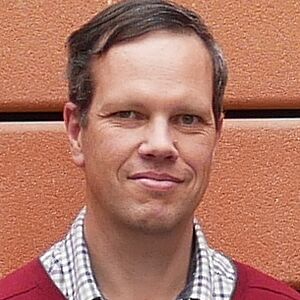
Jean-Yves Dieulot
Axes de recherche
I work on control of multiphysics systems, with an application to many a domain (biochemistry, power systems, mechatronics, see the supervision section). Currently I focus on
• nonlinear control design using energetic approaches (mainly port-Hamiltonian) with application to control allocation for multivariable systems (bioreactors, multisource power cells, assisting devices and cobots)
• predictive control for power grids with renewables
Below you will find a list of recent PhD studs with links to their thesis (in French or in English) and a few illustrations of their results.
Supervised PhD students (recent)
Power systems
Lamine CHALAL 2013 Coordination of multisource renewable power systems, cosup Pr. Geneviève DAUPHIN-TANGUY
Juliette MORIN (in English) (funded / Enedis) 2016, Joint TSO-TSO voltage and reactive power control at HV/MV systems interface and development of real-time Volt Var Control of distribution networks, cosup. Pr. Xavier Guillaud , Dr. Frédéric COLAS (L2EP)
Jérôme BUIRE (funded / Enedis) 2018 Embedding consumption and production uncertainties into the predictive control of a grid with multiple feeders, cosup. Pr. Xavier Guillaud , Dr. Frédéric COLAS (L2EP)
Martin LEGRY (funded/ ENGIE) , 2019, Design and coordination of microgrids connected to a MV network, cosup Christophe SAUDEMONT, Frédéric COLAS (L2EP)
Honorat QUINARD (started 2021/funded European Project) Power management system of a building with renewables and a fleet of vehicles, codir. Frédéric COLAS (L2EP)
Energetic Design of controllers
Mohit MAKKAR (in English) 2015: Port-Hamiltonian control of biological systems
Matthieu TOURON 2016 Energetic approach for design and synthesis of Operator Assisting Systems, applcation to helicopter control, co sup. Pr. Pierre-Jean BARRE, Julien GOMAND (LSIS)
Houria CHAABNA ,defended 2020, Port Hamiltonian control of hybrid systems
Sumit SOOD (funded by project E2C) defended 2021, Control and diagnosis of a multisource platform for the production of clean hydrogen, co. sup Pr Belkacem OULD BOUAMAMA, Mathieu BRESSEL
Rim ABDALLAH (started 2021) Scheduling of a hydrogen refuelling station, co sup Dr Anne-Lise GEHIN
Port Hamiltonian systems = an example with operator assistance
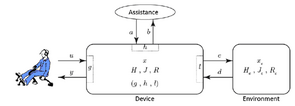
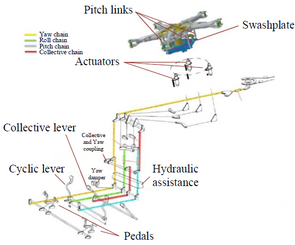
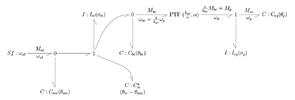
PTF elements are power amplifiers from the assistance
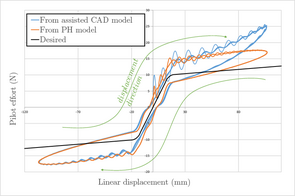
We describe how control might lead to amplification of an operator effort. In this case, assistance helps a helicopter pilot to transform an effort to a stick to the swashplate that controls the rotor, through a kinematic chain. A Bond Graph of the assistance can be drawn. Structural conditions can be given for the assistance using the Port Hamiltonian formalism. Then, one can see that the controller is effective, and quite close from reality!!!. (PhD thesis M. Touron)
Model Predictive Control in Power Grids

Future inputs are calculated within a moving horizon

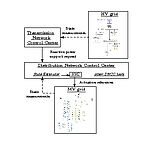
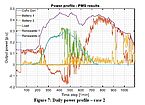
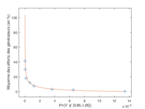
Our experience of control in Smart Grid is to provide Power Management Systems via Model Predictive Control.
When Decentralized Generators are inserted in a grid, reverse power flows occur and the lowest node voltage is not necesarily located at the end of the feeder, nor the highest at the transformer. Hence controlling voltage and reactive power flow becomes a challenge, wether in islanded mode or for distribution grids.
We use model predictive control or optimization routines. Model predictive control is a well known technique that yields a sequence of inputs by minimizing a criterion over a receding horizon.
Our specificity is to provide a (quasi-static) model of the grid, with some actuator nonlinearities (at the transformer side).
Another work consists of assuming that the renewable productions and consumptions are stochastic. Then, it is possible to optimize the droop-like local controllers of the renewable sources, in order to maximize the probability that the voltages remain in a prescribed domain. This joint confidence leveln problem is difficult to solve and we proposed some techniques (inspired from Dinkelbach method, a Newton-like algorithm) to get a solution in a reasonable time for large scale grids.
Control of multisource power cells
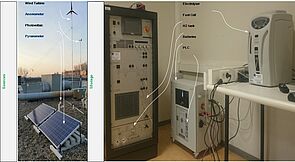
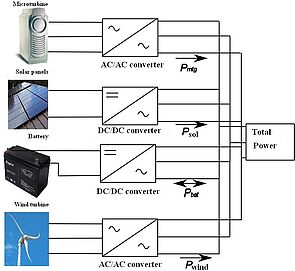
Multisource power cells embed different kinds of power sources and energy tanks. The difference is that the internal grid is not considered.
We used again MPC based on an economical criterion to supervise a power cell with real (battery, solar panels) and emulated devices (with power amplifiers), that is a gas turbine and a wind turbine.
Another platform is the MODIS-H2 hydrogen generation and use device in Polytech-Lille where the power cell includes renewables, storage devices, a fuel cell (PEFMC) and an electrolyzer. Control is realized by health-aware MPC or Port Hamiltonian power sharing with virtual energy tanks
From the PhD of Sumit SOOD, (ongoing), the diagnosis and prongnosis of electrolyzers has been done with the help of a Bond Graph Model
The PhD Thesis of Rim ABDALLAH (started in november 2020) addresses the planning of a fleet of hydrogen powered vehicles thanks to a hydrogen refuelling station



